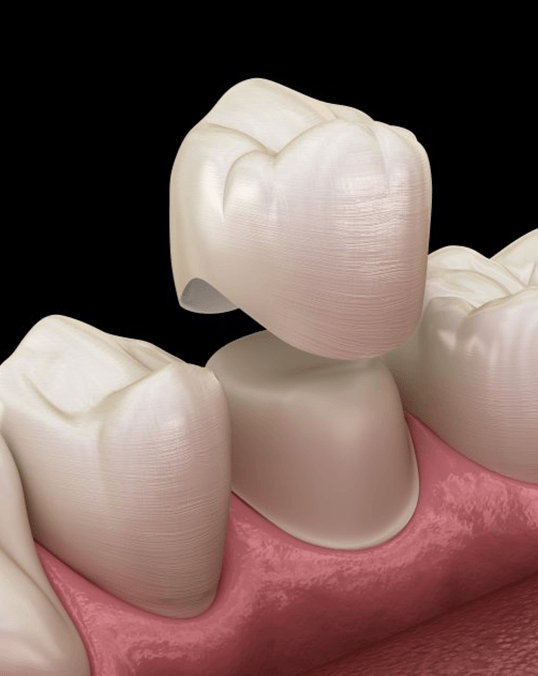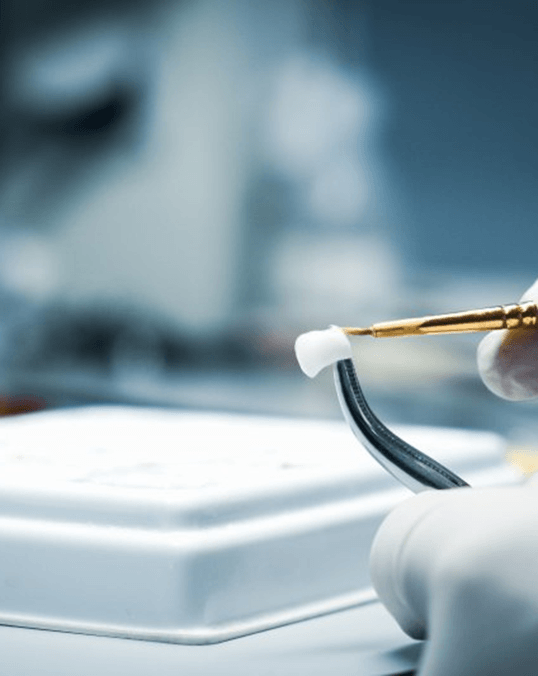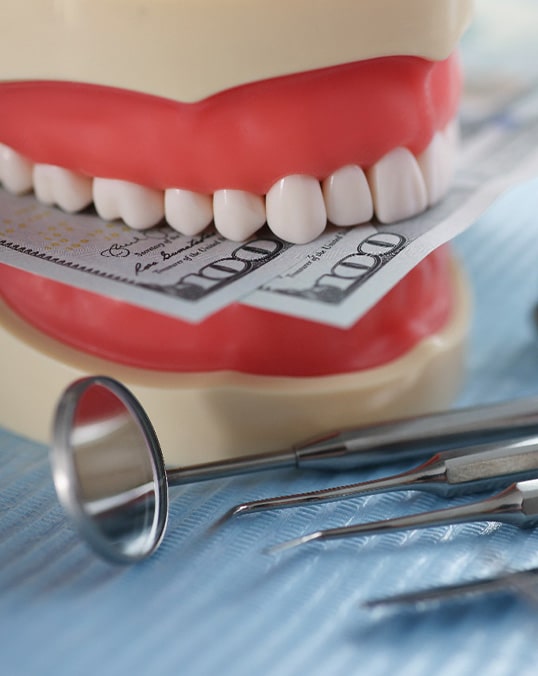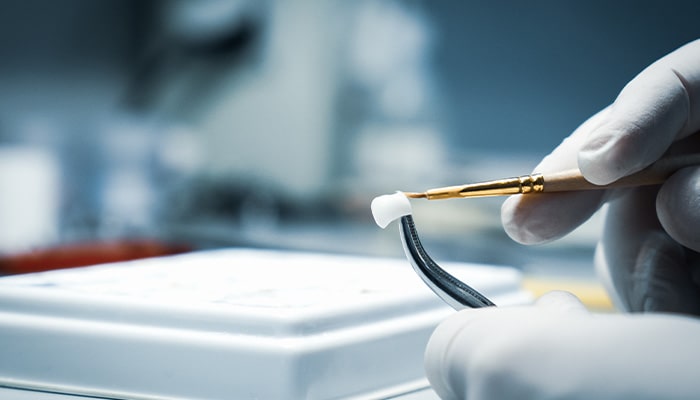Dental Crowns – Saint Peters, MO
Lifelike Solution for Repairing Teeth
Do you have a tooth that’s been damaged due to sports-related trauma? Have you noticed a cavity or decay in your smile? In either case, we can repair and strengthen your tooth with a dental crown. These durable and natural-looking restorations can help address pearly whites that have been decayed or damaged, allowing you to preserve and make the most of your natural tooth for longer. Keep reading to learn more about dental crowns in Saint Peters or give us a call today to schedule your initial consultation!

Why Choose Klassik Smiles of Dental Crowns?
- Completely Custom & Durable Restoration
- Use State-of-the-Art Dental Technology
- Highly-Trained & Experienced Dental Team
What Is a Dental Crown?

Also referred to as a “dental cap,” crowns are restorations that are designed to completely cover a damaged or decayed tooth to improve its appearance and structure. They can be constructed out of various materials, including zirconia, porcelain-fused-to-metal, EMAX, and porcelain to provide lifelike results. Our team will also ensure they specifically match your smile, meaning others won’t even notice the difference.
In most cases, we’ll recommend dental crowns for those who have:
- Severely damaged or decayed teeth
- Undergone root canal therapy
- Discolored or misshapen teeth
- Dental implants that need to be topped with a restoration
- A bridge that requires support
The Dental Crown Process

You’ll likely need to plan on visiting our dental office at least two times. The first step is to schedule an initial consultation with our team. During this visit, Dr. Makwana will review your medical/dental history and assess your oral health for any underlying issues. If you’re eligible for dental crowns, we’ll remove any damaged structures to prepare the tooth to receive a crown. Then, we’ll take impressions of your bite.
These are then sent to a dental lab where a custom dental crown is crafted. You will be fitted with a temporary restoration that protects your prepared tooth. Once the custom crown arrives, you’ll return to our practice and exchange the temporary one for your final dental crown. We’ll verify that your restoration fits and that you’re satisfied with the results before sending you on your way.
The Benefits of Getting a Dental Crown

By getting a dental crown to protect and repair a compromised tooth, you’ll be sure to appreciate a wide range of benefits, such as:
- Personalized treatment that addresses various problems, like discoloration and decay
- Durable and lifelike results
- Protect your natural pearly whites from future potential damage
- Enhanced comfort and chewing power
- Can last well over a decade with proper care
Understanding the Cost of Dental Crowns

As you consider dental crowns, you’ll naturally want to learn their price. That’s only fair – you can’t buy a treatment (however crucial) that greatly exceeds your budget. Still, the cost of dental crowns isn’t fixed; you’ll need to consult Dr. Makwana for a precise estimate and similar details. Our team can then guide you through the relevant pricing factors, dental insurance, and payment options. For more information, please keep reading or call our office.
Factors That Affect the Cost of Dental Crowns

At your initial consultation, our team will give you an oral exam. This step will (among other things) assess factors that affect your dental crown’s final price, including:
- Your Tooth’s Damage – Dental crowns cost more when teeth are severely damaged. A slightly chipped area may only need the cap itself, while major breaks or cracks may require a root canal first.
- The Crown Material – Your crown’s price is partly influenced by its material. For example, metal amalgam types cost less than porcelain or EMAX crowns.
- Crown Processing – Even how a dental crown is made impacts its price. If it’s milled the traditional way, it usually won’t cost too much. Meanwhile, dental crowns processed with CEREC technology are pricier.
Beyond the points above, please remember that the cheapest dental crowns aren’t ideal! Their low prices reflect poor quality, so you’re better off aiming a bit higher. Consider a more moderately-priced crown to ensure your final results look good, feel good, and last many years.
Does Dental Insurance Cover Dental Crowns?

A dental crown treatment is a major procedure, so dental insurance often covers it. Many plans will even meet 50% of a crown’s price if deemed medically necessary. For that reason, you’d be wise to make the most of your benefits.
All that said, there are exceptions to the points above; your own plan may differ from the norm. You should confirm your plan’s benefits before you commit to anything. If you’d like, our dental team will gladly help you with that process.
Other Options for Making Dental Crowns Affordable

With or without dental insurance, you can still make a dental crown more affordable. All you need to do is rely on our practice’s helpful payment options! Here at Klassik Smiles, we happen to offer:
- In-House Savings Plan – By paying an annual fee, you can join our practice’s in-house savings plan. This setup will give you a 10% discount on dental crowns.
- Flexible Financing – Our office works with CareCredit, a reputable 3rd party financier. They’d let you pay for dental crowns in easy monthly installments, all with little to no interest.
You don’t need to “break the bank” (so to speak) to pay for quality dental crowns. Instead, visit our office and learn how to properly finance your treatment.
Dental Crown FAQs
How Long Do Dental Crowns Last?
As you can imagine, the amount of time that your dental crown will last varies from person to person. On average, dental crowns tend to last between five and fifteen years, but the exact timeline can vary based on several factors.
For one, dental crowns made from certain materials will last longer than others. Metal lacks in aesthetics compared to other materials but will typically outlast ceramic or zirconia. The quality of your dental hygiene is also critically important—the better you take care of your crown, the longer it will last.
Do Dental Crowns Get Cavities?
The materials that dental crowns are made from, both metal and ceramic, are resistant to the acid erosion that normally causes tooth decay. This means that it’s impossible for a dental crown itself to develop a cavity.
However, it’s still possible for bacteria to sneak underneath your restoration and attack the enamel. Your tooth may still develop a cavity, even if it’s protected by a dental crown; in fact, these teeth are just as likely to develop decay as any other. For that reason, you’ll still need to floss and brush your crowned tooth thoroughly.
Do Dental Crowns Feel Natural?
Of course, it’ll feel a little bit strange having a new dental crown in your mouth. However, the restoration will be made from high-quality materials and will be perfectly customized to fit your smile—this being the case, you can expect your restoration to feel completely natural once you’re used to it.
You might notice that your dental crown feels a little bit unusual when you run your teeth across it, but this won’t be visually apparent to anyone who is looking at your smile.
Can Dental Crowns Be Whitened?
Dental crowns are made from non-porous materials, which makes them resistant to the stains that can normally discolor your teeth. However, it also means that professional whitening solutions won’t be able to penetrate into the interior of your restoration, making them ineffective.
If you ever become unhappy with the color of your dental crown, the only real option you have is to replace it completely. For that reason, it’s important to be diligent with your dental hygiene, ensuring that your smile will never become discolored in the first place.

